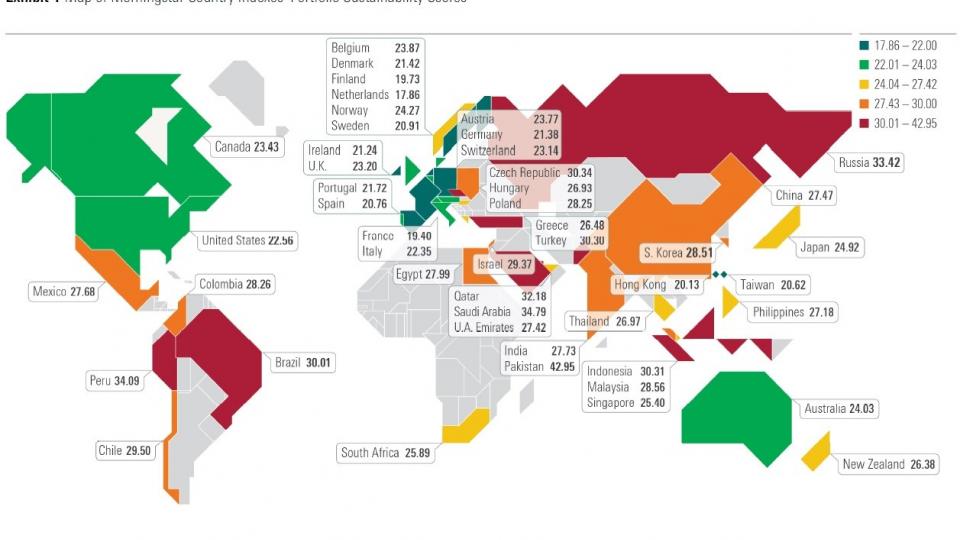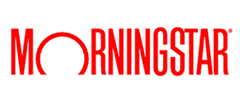
A year ago, the outbreak of the coronavirus pandemic resulted in one of the worst quarters in history for financial markets.
Contrary to what many may have expected, funds focused on buying stocks that score well on environmental, social, and governance-related metrics proved to be a safe harbour for investors.
Indeed, 2020 was an impressive year for sustainable funds: three out of four sustainable equity funds beat their Morningstar Category average. And even though the first quarter of 2021 was a challenging one for the performance of sustainable investments, the long-term investment case for ESG is encouraging: the fact that ESG screens have led to resilience in recent down markets, driven by the relationship between sustainability and attributes like corporate quality and financial health, supports the view that ESG risk is material.
According to the latest edition of the Morningstar Sustainability Atlas, European countries—and particularly those in the north—lead the pack in ESG practices. This is somewhat expected, since these nations have always been ahead of the curve on this front, but a few other countries also feature exceptionally strong sustainability profiles. Investors use this data to identify countries with the greatest ESG investment opportunities and most significant risks.
The Morningstar Sustainability Atlas uses the constituents of Morningstar country indexes to examine the sustainability profiles of 48 country-specific equity markets. The company-level scores are sourced from Sustainalytics.
Let's look at some of the key findings:
The Netherlands Leads, Emerging Markets Lag
As in previous editions of the Sustainability Atlas, the Netherlands is the world's most sustainable stock market. Meanwhile, France has overtaken Sweden and Finland for second place in the rankings. This is primarily due to big companies like luxury goods firm LVMH and electrical equipment supplier Schneider Electric, both classified as ESG outperformers. Finland ranks third thanks to companies such as Nokia, a leader within the global technology hardware industry.
Hong Kong ranks fourth and is the most sustainable non-European market. Insurance company AIA Group—by far the biggest name within the benchmark—combines low risk exposure with strong management. Taiwan also lands in the top five, thanks to the big role played by Taiwan Semiconductor Manufacturing, a global ESG leader.
At the same time, several big Asian markets score poorly on sustainability, with Japan, China land and South Korea all further down the pack. The weakest performers, however, a number of Middle Eastern, Latin American, and Eastern European emerging markets, including Russia and Brazil.
The US ranks 13th out of 48. On one hand, companies like Apple, Microsoft, Berkshire Hathaway, and Visa are considered leaders from a sustainability point of view, but the ESG risks faced by big names Facebook, Amazon, and Johnson & Johnson are classified as "high", attributable in most cases to companies' involvement in controversies.
For the second year running, the UK ranks 15th out of 48. Several big names in the Morningstar UK Index like Unilever, AstraZeneca, or HSBC Holdings carry a Medium ESG Risk, although the likes of Diageo and Vodafone Group are classified by Sustainalytics as ESG Leaders within their industries.
Countries for Low-Carbon Risk
Climate change might threaten companies' physical assets or business models. They may be affected by policy or regulation aimed at lowering greenhouse gas emissions, their fossil fuel assets may be stranded, or changing popular perception may damage their brand. The Carbon Risk Score assesses the degree to which corporate value is at risk from the transition to a low-carbon economy.
Western European markets like Switzerland, the Netherlands, Denmark, Belgium, France, and Sweden carry the lowest Carbon Risk Scores, as does the US. As a matter of fact, a low level of US stock market value is at risk from the transition to a low-carbon economy because of its technology and healthcare tilt and minimal exposure to energy and utilities.
In terms of Carbon Risk Score, the UK climbs seven positions in the ranking compared with last year, moving to 11th from 18th place. This is due to the market’s tilt towards consumer defensive, financial services, and healthcare stocks. Top constituents such as AstraZeneca, GlaxoSmithKline, and British American Tobacco carry a Negligible Carbon Risk and a null Carbon Overall Exposure Score.
On the flip side is Russia: With nearly 55% of its market cap in energy stocks, it has the world's highest Carbon Risk Score. Also carrying significant carbon risk are energy-heavy markets Poland and Czech Republic.



